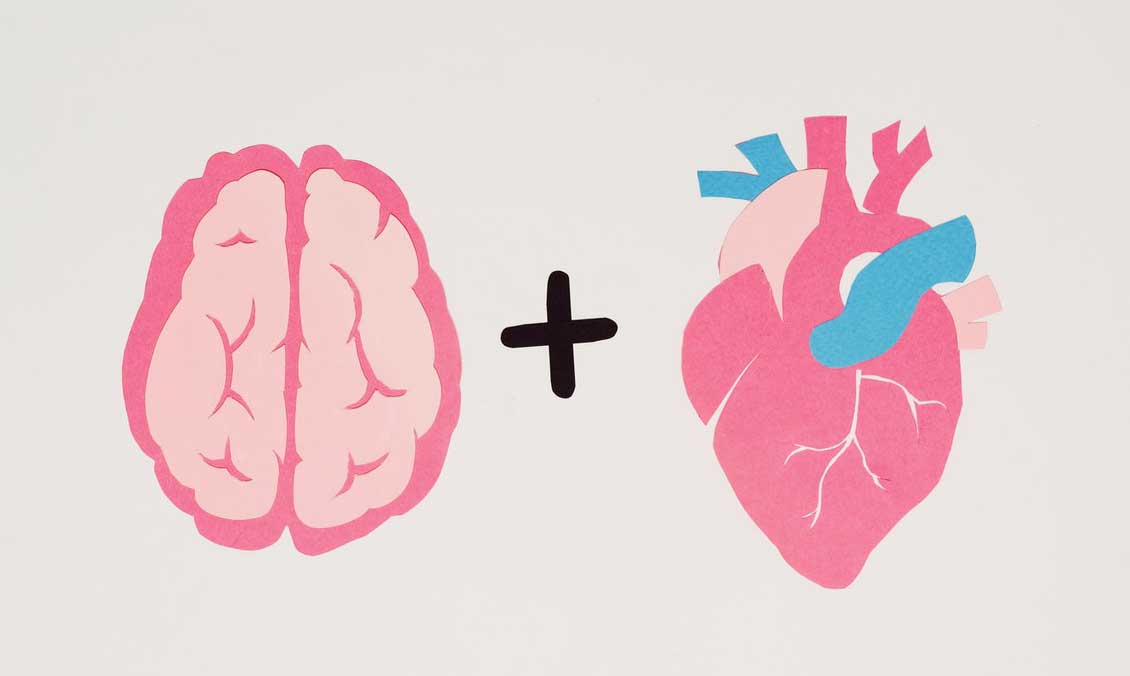There is no question we all want a sharp mind and a healthy heart. But did you know your heart and brain—which are seemingly two very different organs—are closely connected and highly dependent on each other? When one fails, the other is in trouble! That is why as a cardiologist I am just as focused on brain health as I am on the heart.
What is the Heart-Brain Connection?
First off, your brain is what gives your heart its marching orders. When signals go awry, your heart won’t beat as it should— even affecting your heart’s rhythm. Plus, your heart and brain rely on the same vascular system to fuel them with oxygen and nutrients and carry away waste. If your arteries aren’t clear, both organs suffer.
Your heart and brain are also highly susceptible to oxidative stress, chronic inflammation, disruptions in blood flow, and more. In fact, the intricate network of your brain and its 100 billion cells (neurons) are even more vulnerable than your heart to these stressors. When environmental factors damage our brain cells, it can make it downright tough (if not impossible) to think, process information, and recall facts.
The good news is that many of the same recommendations I make for keeping your heart healthy also boost the health of your brain and entire body. Here are the seven most important things you can do:
• Eat a Heart-Brain-Boosting Diet: For heart and brain health, I recommend what I call the Pan-Asian Modified Mediterranean (PAMM) diet, which combines the Mediterranean diet with foods from the Asian side of the Pacific Rim. It includes ample amounts of vegetables, fruits, fish, olive oil, and other healthy fats—including salmon, sardines, nuts and seeds, avocados, and DHA-fortified eggs, which support brain health. Plus, it is important to limit sugar and simple carbohydrates, which can cause inflammation that adversely affects your heart and brain.
• Watch Out for Chronic Stress: When you are stressed, your body releases the “stress hormone” cortisol. This is fine if your stress is short-term and your body quickly returns to normal. Yet, high levels of chronic stress—and elevated cortisol—affect the section of the brain associated with memory and emotions, and cause your autonomic nervous system to be on constant alert. Plus, prolonged stress can damage your body’s ability to know how much cortisol to produce.
To reduce stress, make time for exercise, get plenty of sleep, spend time connecting with family and friends, try alternate nostril breathing, and engage in mindful meditation or yoga. I also recommend taking ashwagandha, which helps to stabilize and rebalance your body’s stress feedback loop. It is also important to make sure you are getting enough magnesium and B-vitamins, often called the “stress vitamins” since they can become depleted during times of stress.
• Limit the “Invisible” Brain Threat: Electromagnetic fields (EMFs) are generated by everything from cell phones to wireless networks, and even our home appliances like televisions, microwave ovens and stereos. This invisible pollution affects all the electrical currents in your body, including those that regulate the beating of your heart and the 500 trillion synapses in your brain. So, limiting your EMF exposure is extremely important. To limit EMF exposure, use a corded landline instead of a cordless phone and only use your cell phone on speaker. Never put a cell phone up to your ear and near your brain—which is even more important for children since their bodies are highly susceptible to radiation. I also suggest hard-wiring your computer using an ethernet connection, instead of Wi-Fi. Plus, avoid using microwave ovens. Earthing, where you connect to the Earth by walking barefoot or using a grounding pad, also helps to protect you from EMF radiation.
• Be Aware of the Statin-Brain Link: While several medications can cause symptoms like brain fog, one of the biggest ones to be aware of is cholesterol-lowering statins. In addition to suppressing the production of cholesterol, statins inhibit your body’s production of coenzyme Q10 (CoQ10), which can result in brain fog. Plus, driving cholesterol too low with statin drugs affects brain function. That’s because your brain needs cholesterol to form the synapses between the neurons in your brain that enable you to think and process information. If your LDL cholesterol gets too low, you can even end up with total global amnesia, where you forget where you are and who you are, for a few minutes or even several hours. This is extremely rare but does happen as I’ve addressed several cases in my time as a cardiologist.
• Get the Creative Juices Flowing: While mentally stimulating exercises like crossword puzzles and Sudoku are good for the brain, physical exercise is an important brain booster. Both aerobic exercise and strength training help to improve blood flow to the brain. Plus, they help to boost your levels of the growth factor BDNF, which helps to promote the formation of new brain cells and neural connections.
• Watch Your Blood Pressure: Approximately 20% of the oxygen you breathe in goes to your brain and high blood pressure can keep your brain from getting the oxygen it needs. Healthy blood pressure is around 120/80 mmHg. Some of the best foods for your blood pressure include beets, blueberries, garlic, onions and apples.
• Give Your Body the Right Supplements: To support heart and brain health, I recommend a good multivitamin, which contains plenty of B-vitamins. I also recommend taking coenzyme CoQ10 (100 mg daily if you are taking a statin), along with omega-3 essential fatty acids and magnesium. For added brain support, take turmeric, American ginseng, and vitamin K2. Plus, acetyl L-carnitine and resveratrol are protective for both the cardiovascular system as well as the brain. Be sure to look for highly bio-available forms of these nutrients, including turmeric, to enhance absorption in the body.
Finally, imagine your heart and brain holding hands. Just like good friends, they support each other and you can do your part by supporting these two critical organs that must be in tip-top shape for good health to support you throughout your entire lifetime.
 Dr. Stephen Sinatra is one of the most highly respected and sought-after cardiologists whose integrative approach to treating cardiovascular disease has revitalized patients with even the most advanced forms of illness. He has more than 40 years of clinical practice, research and study, starting his career as an attending physician at Manchester Memorial Hospital in Connecticut. He is known as one of America’s top integrative cardiologists, combining conventional medical treatments for heart disease with complementary nutritional, anti-aging and psychological therapies. He is an author, speaker and adviser for the research and development of nutritional supplements with Healthy Directions. Sinatra is a best-selling author of more than a dozen books, including, Heartbreak and Heart Disease, The Great Cholesterol Myth, Reversing Heart Disease Now, Heart Sense for Women, The Sinatra Solution, and Metabolic Cardiology.
Dr. Stephen Sinatra is one of the most highly respected and sought-after cardiologists whose integrative approach to treating cardiovascular disease has revitalized patients with even the most advanced forms of illness. He has more than 40 years of clinical practice, research and study, starting his career as an attending physician at Manchester Memorial Hospital in Connecticut. He is known as one of America’s top integrative cardiologists, combining conventional medical treatments for heart disease with complementary nutritional, anti-aging and psychological therapies. He is an author, speaker and adviser for the research and development of nutritional supplements with Healthy Directions. Sinatra is a best-selling author of more than a dozen books, including, Heartbreak and Heart Disease, The Great Cholesterol Myth, Reversing Heart Disease Now, Heart Sense for Women, The Sinatra Solution, and Metabolic Cardiology.




















